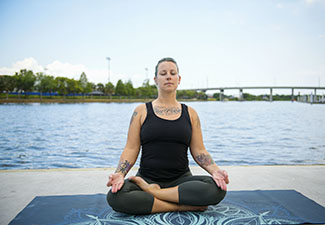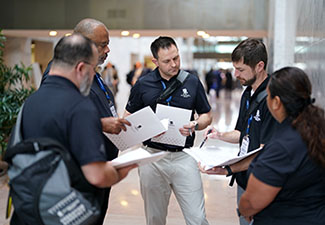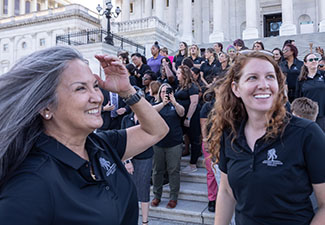Championing Veterans Needs Through Advocacy

Service is uniquely engrained in all warriors, and for Caroline Fermin, communications and advocacy have always been key aspects of the meaning of service. She spent 25 years in the Marine Corps, primarily serving as a communications officer, a role she enjoyed because it allowed her to experience field time and deployments. Later, she became an adjutant, responsible for all administrative support for the commander.
She served on the staffs of several three- and four-star generals during Operation Iraqi Freedom and Operation Enduring Freedom, managing all combat awards, replacements, and casualty reporting. Lastly, at U.S. Central Command, she was the director of personnel.
Now, Caroline is continuing her service both in her role as director of veterans affairs at Beaufort County Veterans Association and as a warrior advocate leader with Wounded Warrior Project® (WWP), representing and championing the needs of other veterans and service members on Capitol Hill.
WWP™ sat down with Caroline to discuss the important role that advocacy plays in the lives of veterans and to find out more about why advocating for the needs of wounded warriors, by amplifying their voices before policymakers, is so important.
Tell me about your current role.
Caroline: As a warrior advocate leader for Wounded Warrior Project, I serve as an advocate and ambassador for my fellow warriors. I also promote WWP’s mission of honoring and empowering wounded warriors while fostering community engagement, leadership development, and peer support.
As the director of Veterans Affairs for Beaufort County (South Carolina), I serve as the key advocate and resource for Beaufort County veterans, their families, and survivors. My team and I assist veterans in accessing the benefits, services, and programs they are entitled to and ensure their needs are met effectively and efficiently.
Their voices help shape policies that honor their service, support their reintegration, and ensure that future generations of service members are better cared for.
Why is your role so vital and why do veterans’ voices need to be heard in this way, on Capitol Hill?
Caroline: It’s critically important for veterans to be on Capitol Hill. It is not just about advocating for veteran benefits; it is about contributing their unique perspectives to the broader legislative process. Their voices help shape policies that honor their service, support their reintegration, and ensure that future generations of service members are better cared for.
Many legislators lack military experience, but hearing real stories drives real change. Veterans bring unique, lived experiences and perspectives that are critical for shaping effective policies. Their insights, gained from their service and sacrifice, are invaluable in understanding the real-world impact of policy decisions.
Veterans understand the real-world impact of policy decisions and can highlight gaps in existing systems.
What is the impact of advocacy?
|
According to WWP’s Women Warriors Report, 45% of WWP women warriors experienced military sexual trauma (MST). |
Caroline: The Post-9/11 GI Bill, the VA Mission Act, and the PACT Act are but a few examples of the impact of advocacy. Advocacy efforts can inform policies, shape public perception, and drive meaningful change.
It can not only shape laws and increase funding allocations, but it also brings awareness of critical or emerging issues such as PTSD, military sexual trauma (MST), and the difficult transition back into the civilian world. It also ensures that underrepresented groups, such as women warriors, minority veterans, or those with disabilities, have their concerns heard and addressed.
Lastly, for the advocate warrior, it can often be a powerful way to process personal experiences and turn pain into purpose.
Track the status of key veterans legislation through WWP

Why is this especially important for women warriors?
| According to the latest WWP Women Warriors Report, 53.2% of women warriors had difficulty or delayed getting care for physical injuries or problems. |
Caroline: Advocacy for women warriors is especially important because women face unique challenges and systematic barriers that are often overlooked. Despite being the fastest-growing segment of the veteran population, their voices are frequently underrepresented in policy decisions and public discourse. It’s crucial to address this imbalance and ensure that women’s unique needs are met.
We need to address issues like women’s unique health care needs, combating MST, fighting gender bias in the system, expanding access to benefits, and supporting mental health and other services that aid in the transition back to civilian life.
What is VA currently doing to support women warriors?
Caroline: VA has implemented several initiatives and programs to support women veterans. These efforts specifically focus on addressing their unique healthcare, advocacy, and overall well-being needs.
|
According to the latest WWP Women Warriors Report, 76.9% of women warriors have sought professional mental health care. |
- Women health care centers.
- Maternity care coordination.
- Reproductive services.
- Free MST care and trauma-informed services.
- Mental health services.
- Transition and employment.
- Homelessness prevention: HUD-VASH prioritizes women veterans, especially those with children.
- Advocacy and outreach.
- Women Veterans Call Center (855.VA.WOMEN)
- Center for Women Veterans
- Community-based events
- Research and innovation in topics such as breast cancer, menopause, and cardiovascular health.
How can other veterans advocate for themselves and their needs?
Caroline: I believe all veterans can advocate for themselves, especially for their specific needs. The key to advocacy is to know your rights and benefits, utilize peer support networks, such as WWP, be persistent, document everything, and leverage community resources. If they need more assistance, I recommend connecting with a veterans service officer (like me), contacting elected officials, and, in rare cases, consulting with legal support.
Is there anything we didn’t ask that is important to note about the role of advocacy in veterans’ lives?
The more voices are heard, the more issues cannot be ignored.
Caroline: Veterans can get involved by joining one of our many veterans service organizations; they can get involved in legislative advocacy by attending hearings, contacting their elected officials, participating in community service, and sharing their personal story. WWP facilitates each one of these. You can reach the WWP Government and Community Relations Team at advocacy@woundedwarriorproject.org.
The WWP website features the organization’s legislative priorities. If veterans read up on the bills that resonate with them, they can reach out to their U.S. Representatives and Senators from their state.. Advocacy is not just about benefits; it is about ensuring their voices are heard, respected, and supported. The more voices are heard, the more issues cannot be ignored.
Contact: Kaitlyn McCue, Public Relations, kmccue@woundedwarriorproject.org, 904.870.1964
About Wounded Warrior Project
Since 2003, Wounded Warrior Project® (WWP) has been meeting the growing needs of warriors, their families, and caregivers — helping them achieve their highest ambition. Learn more about Wounded Warrior Project.



